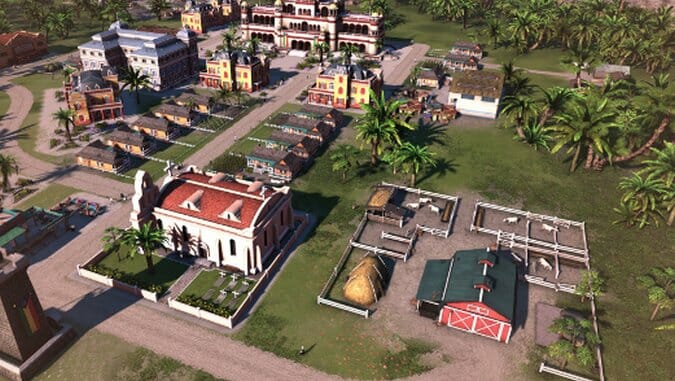Tropico 5 (Multi-Platform)

There was a moment during the Tropico 5 campaign when a rival power invaded my island while a volcano was erupting. My militia army was trying to organize while quite literal fire was raining down from the sky and destroying my entire town. Dante’s Peak flashed before my eyes, but with soldiers.
Sadly, that moment was the high point of my enjoyment during the ten or so hours that I spent trudging through Tropico 5’s campaign. The long-running series, whose first game was released in 2001, has remained largely unchanged since that time. This game continues the long tradition of playing as a dictator of a tropical island nation filled with stereotypes and a mashup of the the tendencies of dictators worldwide.
Tropico 5 works on a system that roughly matches up to the technological progression from the 19th century up until the contemporary period. While the campaign has you play through that time period in a larger way (each period is a set of missions), a single session of “free play” in the classic sandbox mode allows you to progress through those periods through a series of unlocks achieved by gathering “research points.” These various unlocks allow you to do things like discover the shovel, the gun, and then the internet, although with a significant amount of time between those events. With each technology comes a specific building or policy, most of which allow you to better situate and control the people on your island.
Alongside this progression of technology are systems that manage raw materials gathering, industry, import and export, politics, the physical planning of your island city, and even the people themselves. The gameplay of Tropico as a series has always centered around balancing all of these issues, and Tropico 5 does not make this balancing act difficult. I played through the campaign on the medium difficulty setting, and there were several times when all I had to do was sit back and wait for a process to finish while my overall approval rating (which keeps the player in power over the island) and my wealth continued to go up and up.
I find it difficult to say anything about the mechanics of Tropico 5 other than that they are the obvious continuation of those that came before in the series. As a player of Tropico 4, I find there to be very little difference between the two other than sophistication. You go through the same city and economy planning motions in the same way that you always have, and the differences seem to be small.
This doesn’t mean that I don’t have anything to say about the experience of playing Tropico 5. A quick list of problems that I have with the game would include: a lack of overlays, including healthcare and happiness; no date on traffic (or even if traffic matters in the game at all like it did in Tropico 4); a severe lack of building effectiveness outside of a very small area (hospitals and newspapers don’t stretch very far); a confusing population percentage support mechanic that obfuscates how it actually operates.
Of course, all of these mechanics are built on top of a single assumption: you are the ruler of an island nation, and you are prone to dictatorship. Tropico 5 walks a very fine line around what kind of content you can extrapolate from the real-world dictatorships and put into a game. For instance, the opening time period of the game is the Colonial era, and your goals during this time are to manage your relationship to the Crown (so that you are not removed from your governorship) while also bolstering the revolutionaries on your island (in order to achieve a revolt and create a constitution). This set of tensions illustrates the real tensions between positions of power, colonial rulers, and their subjugated populations.
However, this interesting bit of content in the game is muddled when put into context with the larger apparatus of the game, and seems, to me, to speak to a development team with goals which were at odds with one another. At the time same as you have a fairly sophisticated argument for the structure of revolution under colonialism, you also have loading screens filled with zany facts about dictators around the world. Did you know that Kim Jong Il directed musicals? Whoa!

